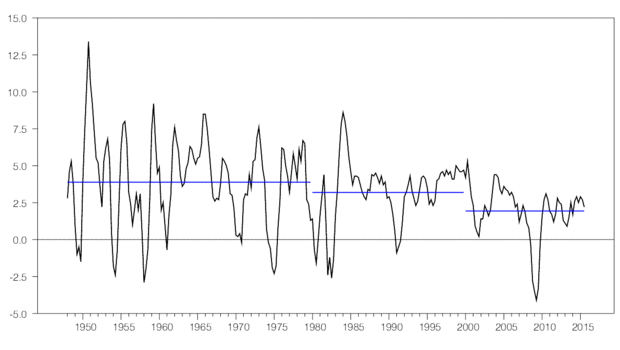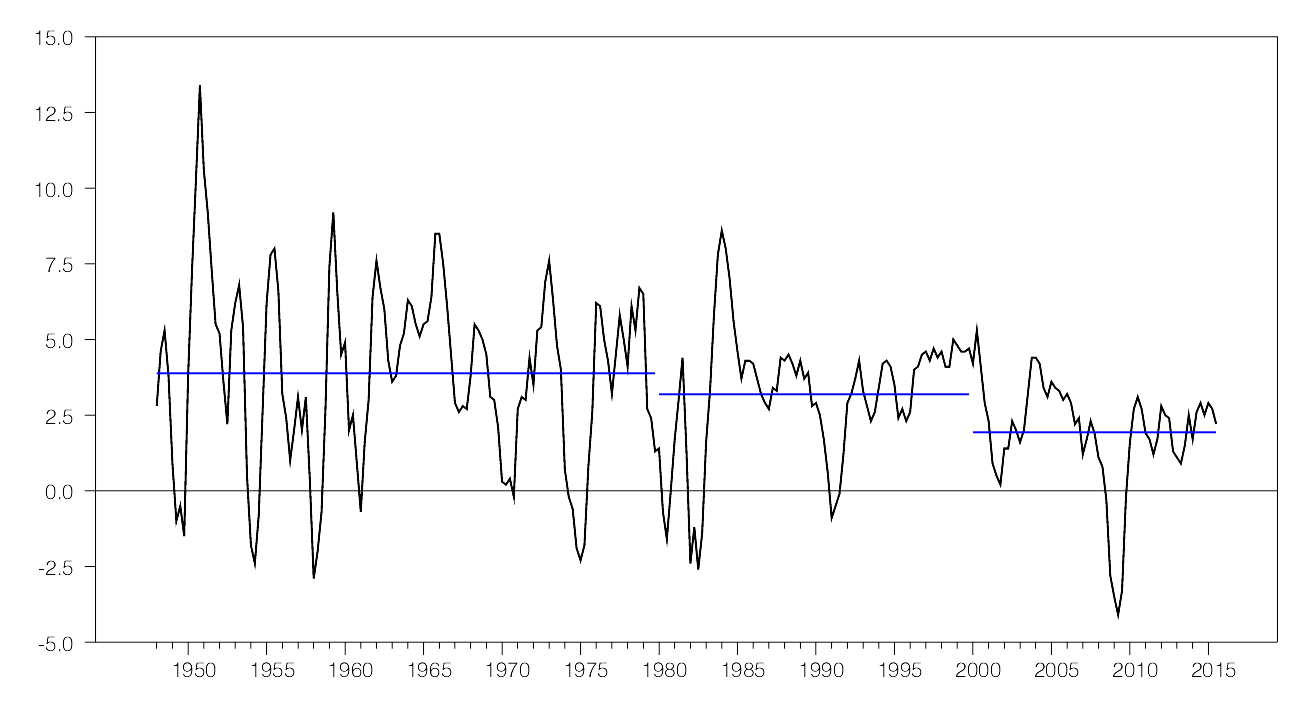This should be the top topic at Davos in 2016
What should participants from around the world be talking about at the coming annual meeting of the World Economic Forum in Davos, Switzerland, Jan. 20-23?
Among the many worrisome topics they plan to tackle is why global growth is slowing and what should be done about it. But I think that issue needs to be at the very top of the Davos agenda.
To deal this problem, they should start by looking at what's been happening here in the U.S. since the Great Recession ended. Recovery has been slow, but steady. Unemployment has fallen to 5 percent, inflation remains moderate, and the Fed has begun to normalize interest rates. Are America's economic problems mostly behind us?
Not necessarily. Here's a picture of real (inflation-adjusted) GDP growth for the U.S. economy from 1948 through the latest data from 2015:

I broke the data into three somewhat arbitrary periods to show how average growth has changed over time.
In the first period, from 1948 through 1979, average growth was a robust 3.88 percent. In the second period, from 1980 through 1999, it fell to 3.19 percent. And in the last period, since 2000, average growth has been only 1.93 percent. Notice that the last drop in growth started before the recent recession, so it's unlikely the recession's end will fix this problem.
But of course, this isn't just a U.S. problem. GDP growth and productivity are falling similarly in Europe and Asia. It will take a cooperative effort by all countries to solve this problem, and that's why it must be at the top of the agenda in Davos.
Part of the reason for the slowing pace of growth is demographics. As population increases has slowed, so has economic growth. But that's not the entire story. The underlying problem is that productivity, the source of economic growth, has fallen much like the drop in GDP growth, and economists aren't sure why.
One hypothesis is that all of the good ideas, the ones that really make a difference in our living standards, are gone. We've already invented the things that can greatly boost our well-being: We have water supplies, roads, plumbing, stoves, cars and so on that allow us to do most of what we need to do.
But I find that to be somewhat implausible in the age of digital technology, robots and so on.
Another hypothesis is that we've entered a condition called "secular stagnation," an extended period of time when the economy gets stuck in a low-growth state. This occurs when saving exceeds investment and the mechanism that fixes this problem -- a fall in interest rates -- is broken. It's not certain that this is happening, but Larry Summers has made persuasive arguments that it's a real possibility.
Whatever the source of the problem, the solution is more productive investment and more technological innovation, both of which are key components of GDP growth. Tax incentives, for example, could be used to raise private sector investment and encourage innovative activity, especially in areas such as protection against global warming.
But there's no reason to expect that private sector investment will be enough to solve this on its own. Public investment -- government spending -- on infrastructure will most likely also be needed. Some countries, particularly developing nations, will have trouble funding such an initiative, and that's where worldwide cooperation and support can help.
Economists aren't sure we're stuck in a low-growth equilibrium; perhaps in the next year or so the picture will look different. But if we are, the time for action is now.
Fortunately, infrastructure spending can stand on its own merits -- it's needed in any case. And it has the additional advantage of providing some insurance against the possibility of a low-growth, stagnating economy.
How to make this happen in a wide variety of countries is a topic that must be discussed at Davos.

